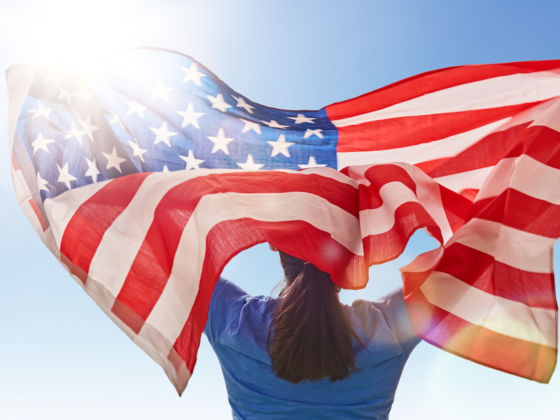It’s a busy week for Americans. Whether you’re heading up to a lake house, stuffing your trunk with fireworks, hosting a BBQ, or just drinking beers on the beach, everyone plans to celebrate the Fourth of July somehow. But the Fourth of July is more than just an excuse to drink — it’s the holiday wherein our national pride is on full display, where even the least patriotic of us feel compelled to don flag-themed bathing suits. Celebrating our Independence Day is a crucial component of our national identity, so it’s easy to assume that the same is true of other countries; particularly older countries, with a longer history to be proud of. But our tradition of patriotism is actually strikingly unique. For many countries, public, elaborate celebrations of national identity are even considered taboo. Here are three countries that view national patriotism completely differently than Americans, which may make you rethink the compulsion to wave a flag when you travel abroad.

Sweden
Founded in 1397, Sweden is a much older country than the United States, and yet their “Swedish National Day” has only been an official holiday since 2005. More popular with immigrants and expats than native Swedes, National Day’s rise to popularity has been incredibly slow. While it gives new Swedish citizens a way to feel connected with their adopted country, for native Swedes, the holiday is rife with political associations. Wary of the rise of conservative nationalist movements, many Swedes view the holiday as a step toward the far right.
Jonas Engman, ethnologist at the Nordic Museum in Stockholm, told the TT news agency that, apart from sporting events, Swedes rarely display the Swedish flag on their clothing or houses, or sing the national anthem. “We are very ambivalent when it comes to National Day,” he says. “We get a bit uncomfortable with national holidays that clearly highlight Swedishness.” Indeed, my last time in Stockholm I spoke with the superintendent of a local school district, who told me that if he ever suggested a “pledge of allegiance”, or anything like it, he would be immediately fired. The omission of a single word — “God” — in our pledge is enough to cause riots, yet in Sweden, simply displaying a flag in a classroom pushes the boundaries of what’s considered appropriate.
Germany
For Germany, it’s the past, rather than the present, that governs their attitude toward national pride. Cultural and historical symbology, especially the German flag, are still displayed somewhat reluctantly. This doesn’t mean Germans aren’t proud to be German, that they’re ashamed of their country, or even that they fear an imminent nationalist uprising; it’s rather because of their profound awareness of recent history. Just 80 years ago, Hitler’s elevation of the Volksdeutsche (ethnic Germans) above all other races, defined one of the most hateful regimes in human history. Rampant nationalism and identity-driven politics plunged Germany into a war still too fresh in their minds.
Germans are fighting an uphill battle against memory, and against history, to reclaim their national pride. They worry that “their patriotism can turn into a dark obsession,” Stephen Grünewald, a psychologist and author of “Germany on the Couch”, told Handelsblatt Global. Even when Angela Merkel won re-election for Chancellor in 2013 — an occasion for flag-waving, one would think — she snatched a small German flag away from one supporter, with an admonishing look. However, Germans are slowly becoming more comfortable demonstrating their national pride, especially after their hosting of the 2006 World Cup. “It was then,” says Grünewald, “that the Germans realized they can be passionate without scaring the rest of the world.”
Ukraine
Celebrating your national identity becomes infinitely more difficult when your country is divided on that identity. Russia celebrates Victory Day on May 9th to commemorate the end of World War II and to honor its fallen veterans. But, for former Soviet states, celebrating Victory Day is complicated. Ukraine, for example, is moving away from its Soviet past and trying to carve out a distinct Ukrainian identity — which isn’t easy when your recent past is dominated by a communist superstate. This period of de-communisation has led to “Victory Day” being rebranded in 2015 as the “Day of Reconciliation and Remembrance,” and “World War II” now replacing “The Great Patriotic War”. Monuments honoring communist officials were removed, streets named after them were changed, and, in an even more extreme move toward westernization, denying the criminal nature of the Soviet regime is now illegal.
While millions of Ukrainians subscribe to this new identity, others are more deeply attached to their Russian past. For Mikola Martinov, head of Kiev’s Organization of Veterans of Ukraine, Victory Day is a time for celebrating Russian pride, and fondly remembering the liberation of Europe by the the Red Army. “How can the government ban the symbols of our victory?” Martinov asked the Irish Times. “The red flag, the star, the hammer and sickle?” Volodymyr Viatrovych, head of Ukraine’s Institute of National Memory, disagrees. “The new Ukrainian identity is an anti-Soviet identity,” he said. “It is a pro-European, pluralistic, and democratic identity – this is what has been denied to Ukraine until now.”
In the Ukraine, we have the clearest example of how complex demonstrations of national pride can be. Holidays are battlegrounds between old and new traditions; between a culture borrowed from the fatherland, and a distinctly local culture. For many around the world, patriotism isn’t a celebration at all — it means looking into the mirror, and choosing a side.